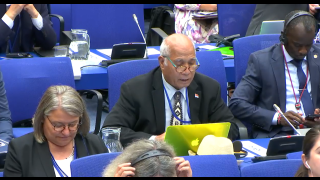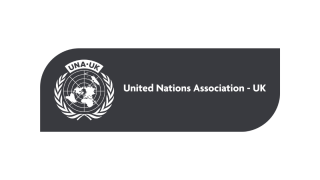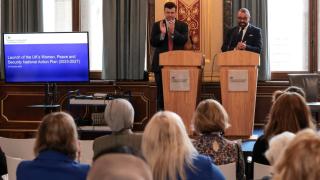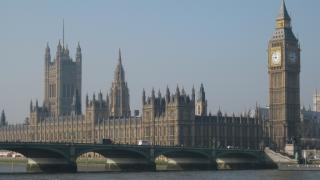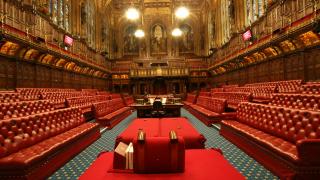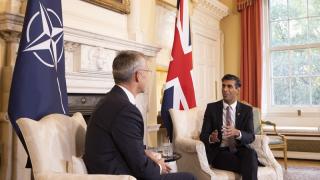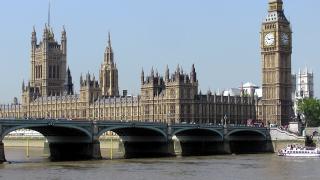
UNA-UK has recently submitted evidence to a number of different parliamentary inquiries. Here is a recap.
Nuclear Non-Proliferation Treaty and nuclear disarmament
UNA-UK submitted evidence to the Lords International Relations Committee in response to their 2019 inquiry on nuclear non-proliferation and disarmament, urging the UK to modify its counter-productive, dismissive approach to the Treaty on the Prohibition of Nuclear Weapons (TPNW) to one of constuctive engagement. We were delighted that our evidence was cited multiple times in the Committee's report and that the Committee recognised the legitimacy of concerns around the UK's approach to the TPNW recommended that the Government adopt "a less aggressive tone towards the treaty and its supporters" - a key advocacy position called for by UNA-UK.
Click here for further work on this issue.
Committees on Arms Export Controls (CAEC)
The CAEC is a joint undertaking of the Defence, Foreign Affairs, International Development, and International Trade Select Committees to scrutinise arms exports. Following the Government’s 2016 report into Strategic Export Controls the Committees encouraged submissions of written evidence on the UK’s export licensing decisions.
UNA-UK submitted joint evidence through our membership of Control Arms UK as well as an independent submission on atrocity prevention, urging the UK to reconcile its actions with its international obligations, particularly the Arms Trade Treaty and the responsibility to protect. These submissions emphasised the undermining effect UK’s conduct is having on rules-based international system through exports to Saudi Arabia – a country responsible for leading a devastating intervention in Yemen. More broadly, UNA-UK’s contributions highlight the corresponding damage to the national interest as a result of the deterioration of the rules-based international system. The final report has now been published.
Citizenship and Civic Engagement in the 21st Century
UNA-UK submitted evidence in response to a parliamentary inquiry on citizenship in the 21st century emphasizing that global values resonate strongly with individuals' sense of identity. UNA-UK would like to see a greater emphasis on education to strengthen global citizenship in the UK. The evidence builds on our #StandForCampaign in support of deeper public engagement on foreign policy issues.
The report supports our evidence though its call for a major expansion in citizenship teaching in the UK. UNA-UK hopes the Government will support this recommendation with an appropriate focus on global learning.
Modernising Defence
On January 25 the Defence Secretary announced the separation of the National Security Capability Review (NSCR) and a new Modernising Defence Programme (MDP), looking at the organisation, efficiency management, and business and commercial practices in the Ministry of Defence (MoD), and a fourth focusing on capability and force structure.
The Defence Committee launched an inquiry into this review and UNA-UK submitted evidence suggesting that UN peacekeeping should play a significant role in force structure. UNA-UK also made a submission to the MDP’s public consultation portal.
The final report cited UNA-UK in support of the idea that decisions around the UK's defence should be made within the context of a wider security strategy which also considers the UK's dipolomatic and soft power responses.
The Royal Marines and UK amphibious capability
Following the National Security Capability Review, a number of reports suggested significant changes to the structure of the Royal Marines and UK amphibious forces. These changes include consideration of reductions in strength of the Royal Marines and the deletion of the Royal Navy’s Albion class ships. The Defence Select Committee aimed to examine the UK’s capability and its importance to UK defence.
UNA-UK submitted written evidence suggesting that 1 Assault Group Royal Marines should be deployed as part of the United Nations Mission in South Sudan instead. This would provide a way for the Royal Marines to maintain a state of combat readiness and to receive active duty experience while the UK remains in peace.
The Committee’s report concluded that the UK’s unique experience and expertise in amphibious operations are assets which will continue to be relevant in the future. As a consequence of UNA-UK’s evidence there was a mention of peacekeeping – the only one – in this report.
Violence in Rakhine State
The Foreign Affairs Committee investigated the humanitarian, political, and security situation in Burma taking into account the international and UK’s diplomatic response, particularly considering the UK’s responsibility on Burma in the UN Security Council.
UNA-UK made a written submission to the Committee and we were pleased to see the Committee include our comments in their report on 'Violence in Rakhine State and the UK’s response'. Our submission covered the importance of safeguarding civilian life in the context of allegations of terrorist activity, and the appropriate use of UN processes and mechanisms.
Subsequently the Government responded to the report. Unfortunately, the response failed to acknowledge several of the issues raised by the Committee. On the key issue of how the UK knows when to implement atrocity prevention policies, and the circular logic the government employs in such circumstances the government disappointingly merely restated their original misunderstanding of the issue.
Global Britain and the UK’s work at the UN
The Prime Minister first introduced her vision for Global Britain in 2016 as a “country with the self-confidence and the freedom to look beyond the continent of Europe” which pursues a new role in the world.
The Foreign Affairs Committee took evidence on the Government’s ‘Global Britain’ policy and whether the FCO has the resources available to deliver it. They are also running a separate, but linked, inquiry on the UK’s relationship with the UN, as the UK has not been able to achieve everything it set out at the UN in 2017. Witnesses explored the factors that might have affected the UK’s support and influence at the UN.
In a ‘pre-report’ the Committee emphasised its intention to explore in detail its objectives for ‘Global Britain’, the reasons behind this, and to make recommendations for its improvement. The initial report criticizes the FCO’s lack of a strategy, and sets out a number of questions that the government will need to answer in order to set a coherent strategic direction for UK foreign policy.
UNA-UK is pleased to see the range of questions that are being asked and that they so closely match those raised by our Keeping Britain Global campaign. UNA-UK has now submitted written evidence.
Responsibility to Protect
The Foreign Affairs Committee launched an inquiry considering the legal basis for military intervention for humanitarian purposes. Its main purpose was to review the conditions that apply and considering whether more could be done using the concepts of the responsibility to protect (R2P) and humanitarian intervention to protect civilian populations, with specific reference to Syria.
UNA-UK has now submitted evidence arguing for the UK to make atrocity prevention a policy priority, pointing out that the lack of a cross-Government mechanism to prevent and address mass atrocities has led to actions that have on occasion been inconsistent - or in direct contradiction to - the UK's international commitments. Subsequent discussions on sanctions led us to submit additional evidence.
The committee’s report cited UNA-UK's work and called for the Government to produce an atrocity prevention strategy plan, ready for consultation by April 2019, echoing a longstanding UNA-UK campaign proposal
The UK’s Human Rights Work
The Foreign and Commonwealth Office (FCO) published its Human Rights and Democracy Annual Report in July 2017 providing evidence on the FCO’s human rights work in the UN. This past Wednesday, UNA-UK’s Executive Director Natalie Samarasinghe provided oral evidence to the Foreign Affairs Committee.
We summarised that evidence in a news article at the time. UNA-UK now submitted written evidence in follow-up.
The final report accused the UK of shielding human rights abusing allies such as Saudi Arabia and sacrificing human rights in the name of trade. Making good use of our evidence the report also stated that "The FCO should publish clear and measurable objectives for its work at the UN" and gave insightful comments on the impact of global power shifts on human rights:
Sexual Exploitation and Abuse
After holding an evidence session on Tuesday 20 February with Oxfam UK; Save the Children GB and Department for International Development (DFID), the International Development Committee (IDC) launched an inquiry on sexual exploitation and abuse in the aid sector.
The Committee’s key concern is allegations of sexual exploitation and abuse of the intended recipients and beneficiaries of humanitarian and development aid by aid sector workers, and peacekeepers focusing on proposals for new approaches to safeguarding within the aid sector to tackle these problems.
UNA-UK submitted written evidence focussing specifically on the UN Peacekeeping element of this work, and how lessons could be applied to the aid sector more broadly. This is in line with our Mission Justice campaign. The committee subsequently asked our Executive Director to give oral evidence and she participated in a parliamentary discussion with Sarah Blakemore of Keeping Children Safe, Paula Donovan of Code Blue, and former Secretaries of State for International Development Andrew Mitchell MP and Clare Short.
The final report has now been published, UNA-UK responded here.
The UK’s NSS/SDSR
In July 2017, the Government announced that it had launched a review of national security capabilities in support of the ongoing implementation of the 2015 National Security Strategy and Strategic Defence and Security Review. Amidst a lack of clarity over exactly how this review was to proceed Parliament’s Joint Committee on National Security Strategy launched an inquiry.
UNA-UK submitted evidence highlighting inconsistencies in the Government’s approach to national security, calling for a wider ranging public consultation on the issue and pinpointing areas where the UK could make a more positive contribution.
The government has now published a report. UNA-UK is pleased to see the committee consider several issues we highlighted in our submission.
Foreign policy in a changed world
A radically changed international environment has evolved and posed new issues of global stability. This phenomenon presents new challenges and opportunities for British foreign policy. That is why the House of Lords International relations Committee will examine the changing aspects of international relations and foreign policy aiming to assess the UK’s capability to adapt to these changes.
UNA-UK submitted written evidence addressing the challenges arising for multilateral institutions underpinning the international rules-based order and how the UK’s international policies should adapt to the shifting environment.
UNA-UK parliamentary evidence index
Committees on Arms Export Controls (CAEC)
UK arms exports during 2016
- The inquiry
- Joint evidence
- UNA-UK’s evidence
- Final Report
Committee on Citizenship and Civic Engagement
Inquiry on Citizenship and Civic Engagement
- The inquiry
- UNA-UK’s evidence
- Final Report
Defence Committee
Modernising Defence Programme
- The inquiry
- UNA-UK’s evidence
- Final Report
The Royal Marines and UK amphibious capability
Foreign Affairs Committee
Violence in Rakhine State
- The inquiry
- UNA-UK’s evidence
- Final Report
Global Britain and the UK’s influence in the UN
- The inquiry
- UNA-UK's evidence
- Final Report (to be published)
Responsibility to protect and humanitarian intervention
- The inquiry
- UNA-UK’s evidence
- Follow up evidence on sanctions
- Final Report
The Foreign and Commonwealth Office’s Human Rights Work
- The inquiry
- Transcript of oral evidence
- UNA-UK's written evidence
- Final Report
International Development Committee
Sexual exploitation and abuse in the aid sector
- The inquiry
- UNA-UK’s evidence
- Transcript of oral evidence
- Final Report
Joint Committee on the National Security Strategy
National Security Capability Review: A Changing Security Environment
- The inquiry
- UNA-UK’s evidence
- Final Report
Lords International Relations Committee
Foreign policy in changed world conditions
Nuclear Non-Proliferation Treaty and nuclear disarmament
- The inquiry
- UNA-UK's evidence
- Final Report

